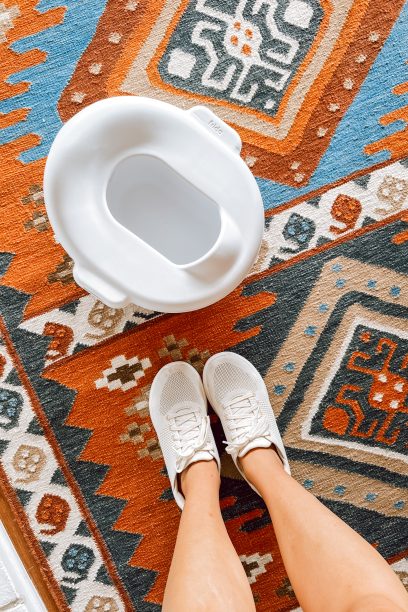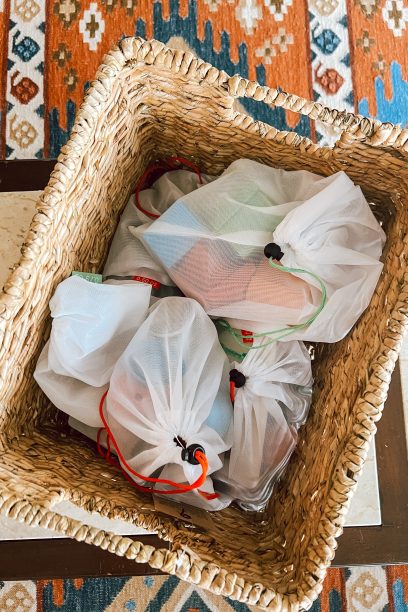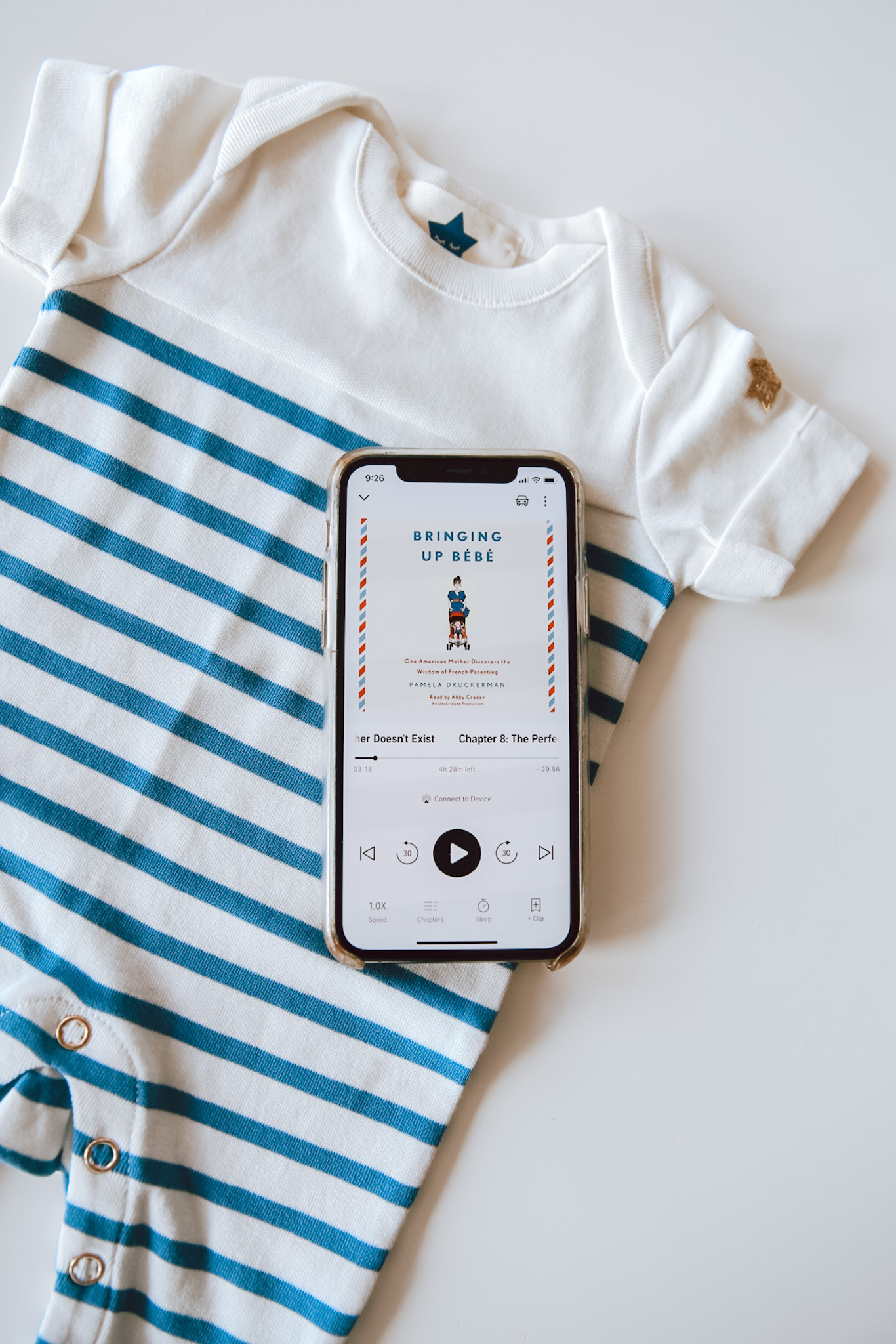
If I had a nickel for every message I received that said, “JESS! What was that book that made you less scared about having kids?! I need that! Help!” I would have A LOT of nickels. I have been meaning to write this blog post about Bringing Up Bebe for months–and today is finally the day that it gets published!
Bringing Up Bebe: The book that made me less worried about “losing myself” in motherhood.
This sentiment seems to be something that so many women are struggling with right now, yet NOBODY is talking about it. And as you know–I am the queen of discussing the things that nobody else is talking about. You could call it a hobby of mine. What good is this platform if I don’t use it to help other women, and most importantly, help others feel seen?
Who this post is for:
Specifically, today I’m talking to those of you who, (like me, not long ago)–KNOW you want a family (or at least you’re trying to decide whether or not it’s right for you), but you are in the panicky stages of not feeling “ready”–and thinking you never will, mostly because you’re worried of losing yourself, and the life you love. It’s a scary grey area of a life phase that we need to talk about more!
Who this post is not for:
This post is also not aimed at those who know they don’t want kids. I would NEVER try to convince someone who didn’t want kids to reconsider their choice. Kids are not for everyone, and we need to celebrate the decisions of those who decide NOT to have kids just as much as we celebrate those who decide to take that path in life.
This post is also not for anyone struggling with infertility and who is very much ready to have a baby. If you have never felt this way, or are having trouble conceiving, I understand how this perspective could be hard for you to read– so PLEASE, if that is you–this is me giving you a big huge hug and pushing you out of here because I never want you consuming content that isn’t going to serve you.
—
Okay, now we can resume!
Ever since I published my pregnancy announcement post, I have received SO many messages echoing my sentiments about being very sure I wanted kids, but not ever feeling “ready”–and feeling like something was wrong with me that I never got “baby fever.” I truly thought I was an outlier–but turns out, I’m not! SO MANY of you feel this way! It’s not uncommon at all!
Truthfully, looking back on it all–HOW could feeling this way be uncommon?
Deciding whether or not to have kids is undoubtedly one of the biggest decisions anyone makes in their life–why would we not expect people to be terrified about it!?
It’s a really weird predicament to be in–confident that you want a family, but not wanting to rock the boat because you love the life you currently have, or because there never seems to be a good time–yet, all at once, your biological clock is working against you, and you feel like you’re slowly being pushed against your will toward the edge of a proverbial diving board dangling above a pool you THINK you want to jump into–but really–DO you?!
I think the trend online (and offline, honestly?) at least in my experience–is to constantly harp on the HARDEST parts of motherhood without sharing any of the magical parts.
It’s almost as if we are glorifying how much of ourselves we can sacrifice when having kids. When those of us who don’t have children consume this content, we have none of the context of how WONDERFUL and rewarding it is to be a mother–so why wouldn’t we be terrified!?
It seems like the second anyone shares that they’re expecting, they’re met with “get ready to never sleep again!”, “kiss your date nights goodbye!” and “hope you got all your traveling out of your system!” And honestly, how are we supposed to feel about this when this is all we know? Who is excited about motherhood when these are the messages ingrained into our brain every day?
In the US, it seems that motherhood is typically associated with “sucking it up” in so many aspects–your body, your sleep, mental health, your career, your own hobbies. (“Hobbies?! What are hobbies?” says the American mother.) We are almost trained that all of these things must now be pushed to the wayside because the sun and earth must revolve around our children at all times. It’s almost like a competition as to who can make the most sacrifices in the name of their kids!
(Yet, people still have the audacity to ask others, “what do you mean you don’t know if you want kids!? YOU HAVEN’T LIVED LIFE UNTIL YOU KNOW THE LOVE OF A CHILD!”)
This was not the motherhood I wanted to sign up for.
Enter a much more palatable alternative to the tired, sacrificial narrative of American motherhood. (Perhaps because it is not about American motherhood at all?): Bringing Up Bebe.
This book showed me a different kind of motherhood that for the first time, I could actually identify with. I read it several years ago (WAY before June was on the horizon) and then I re-read it again when I got pregnant. (Highly recommend the audio version as well!)
It’s an easy-to-read, interesting look at French parenting philosophy. I also am fortunate to be in a place where many of my friends are also having babies, and are already living out many of the principles outlined in this book. Those things together gave me an entirely new perspective on motherhood–one I could actually get excited about. (If you don’t have that example in your life, I hope I can be that person for you!)
Truth be told I started writing this blog post when I was pregnant, but I’m finishing it now that June is four months old. Many of you have asked, “what are your expectations vs. reality as it pertains to the Bringing up Bebe- philosophy/lifestyle you were hoping to lead?” So that’s what we’re talking about today.
A few caveats before we move forward:
I don’t necessarily agree with EVERYTHING in the book. (There’s a section about how French women lose the baby weight quickly that is particularly cringey, for example, and the bit about the French and traditional gender roles which did not sit well with me in terms of my personal philosophy.) But as with everything, take what speaks to you, and leave the rest. I’m not advocating to use this book, or any book, as a sort of parenting bible. I think you should always lead with your gut and do what works best for you and your family.
Additionally, June was 4 months old at the first publishing date of this post. (**However, re-reading it three months later, it all still rings true!) I, myself, have only been a mother for a handful of months. There are MANY challenges that await us, and in many (most?) aspects, this period of time before she can talk, move, eat real foods, etc, is much less complicated. This is simply my experience of living life with a 4-month-old baby–I can’t comment on anything more than that.
Finally, one of the biggest differentiating factors between French parenting and American parenting is that French parents have a LOT of assistance from their government. They have top-notch public daycare, actual maternity leave, FREE pelvic floor physical therapy, etc. We aren’t getting into that today as that’s a TOTALLY different topic for another day.
Nothing in this post should lead you to think that parenting isn’t hard.
We have had a very positive transition into parenthood for the most part. We have gotten lucky. But that doesn’t mean it isn’t hard. It’s hard in the ways I expected and in ways, I didn’t think about. But you probably already know that being a parent is hard! Everything is a phase, and I think everyone goes through their “hard phases” at different times. Does that mean I don’t feel like I’m underwater 99% of the time? Of course not. C’est la vie! That’s life! It’s messy but it’s still fun. (Let’s be honest though, don’t we all feel like we’re underwater a LOT of the time–kids or no kids? I guess now it’s just a different kind of water?)
If transitioning into parenthood has been harder than you were expecting, it’s VERY normal and your feelings are SO VALID. I know many who have said the newborn days were the darkest–and that’s so, so normal. I don’t want anyone coming away from this blog post thinking I’m saying new parenthood is easy. It’s not! But it’s also so much more rewarding, and way more fun than I ever imagined it could be.
Your life is not over–it is just beginning! And that’s not a perspective you see a lot about on social media. I wanted to share about it today because I think so much of that, for me, has been about the attitude and perspective we had going into this new parenthood thing, and I hope it can help others out there too.
That all being said, here are some of the applicable lessons I took away from the book, and how they’re working for us currently.
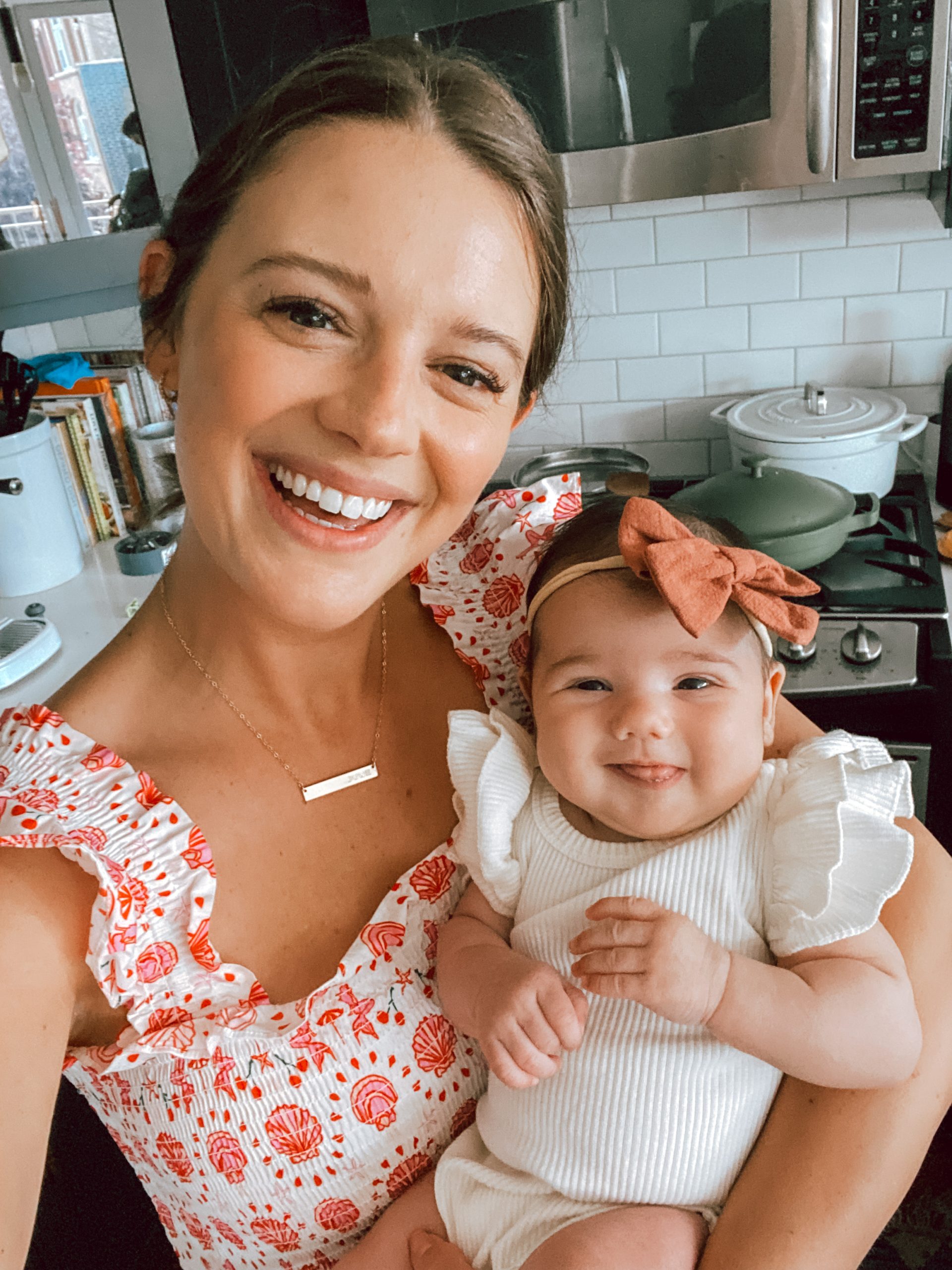
A selfie before my first girls’ weekend away from June. It was so hard to leave her, but SO NEEDED, and I’m so glad I did it!
Four lessons from Bringing Up Bebe, and how we’re implementing them in real life:
Baby revolves around your life, your life doesn’t revolve around baby
This does not mean the baby’s needs are not met, this doesn’t mean that the baby is not the priority, but it means the baby is not the ONLY priority, and the baby is not THE most important thing ALL THE TIME. It means that the baby does not replace everything else that was important before the baby arrived. The baby is not the center of the universe.
This is essentially the overarching theme of the entire book, and it’s a parenting philosophy I knew I wanted to adapt far FAR before we had June. As an enneagram 7, anytime I feel like my choices are being limited or that my freedom is being restricted, I PANIC. There is nothing I feared more than “baby jail” where I couldn’t do the things I loved because I was a mom, so I guess you could say I made up my mind well before June arrived that life would continue to go on and we would figure out to roll with the punches with June in tow as we went.
And I have to say, I’m really proud of us. So far, we’ve done a really great job of doing just that. We haven’t stopped going on vacation, we haven’t stopped getting together with our friends (both as a family and individual boys/girls nights sans baby), and we never lost our ability to do the things that are important in feeling like “us” because we made that a conscious decision and priority from day one.
Do our lives look a LOT different? Of course they do!
But the things that were important to us before June are still just as important to us now. Do we go out to dinner AS much? No. Can we go out for cocktails at 8pm on a whim? No. But that doesn’t mean they don’t still happen. The execution just looks a bit different. (But also, I don’t WANT to go out like I used to pre-baby. My priorities have just naturally shifted, so it doesn’t feel like the sacrifice I thought it would feel like either, if that makes sense?)
Don’t get me wrong though–it takes effort.
Just like any attitude in life, it’s a muscle that needs to be developed. Is it easier to stay in and never go out once you have a baby? Of course it’s easier. And many times, it’s the least stressful option! (Especially if you have a baby that cries so loud you’re afraid windows will shatter.) But that doesn’t mean it’s the best option for ANYONE’s long-term happiness. Just as we “practice” gratitude, for example–we don’t just decide to BE grateful people and suddenly become transformed–maintaining space for YOU after having a baby is a practice.
To put it plainly, if don’t want your life to revolve around your baby, then you have to make a conscious effort for your life to NOT revolve around your baby.
You have to get out there and just DO THE THINGS with your baby in tow. They might cry–they might not! You’ll all live. You’ll all get better at it the more you practice.
You have to make the effort to GET THE BABYSITTER. Even though you’re tired and you want to crawl in bed instead of going out on a date. Do you see where I’m going here?
I think the moral of the story is that you are still in charge of your life and your own happiness. Just like anything else in life, you get to dictate what you want parenthood to look like for you. And there’s no wrong or right way to do that!
Will this be harder for some people than others? ABSOLUTELY.
The ability to do this depends on a wide variety of factors, including the personalities of you and your baby, whether or not you have family close by to help out, whether or not you have childcare–ETC. But the moral of the story is that it’s worth it to make the effort to revolve your baby around your life, and what that looks like will vary from person to person!
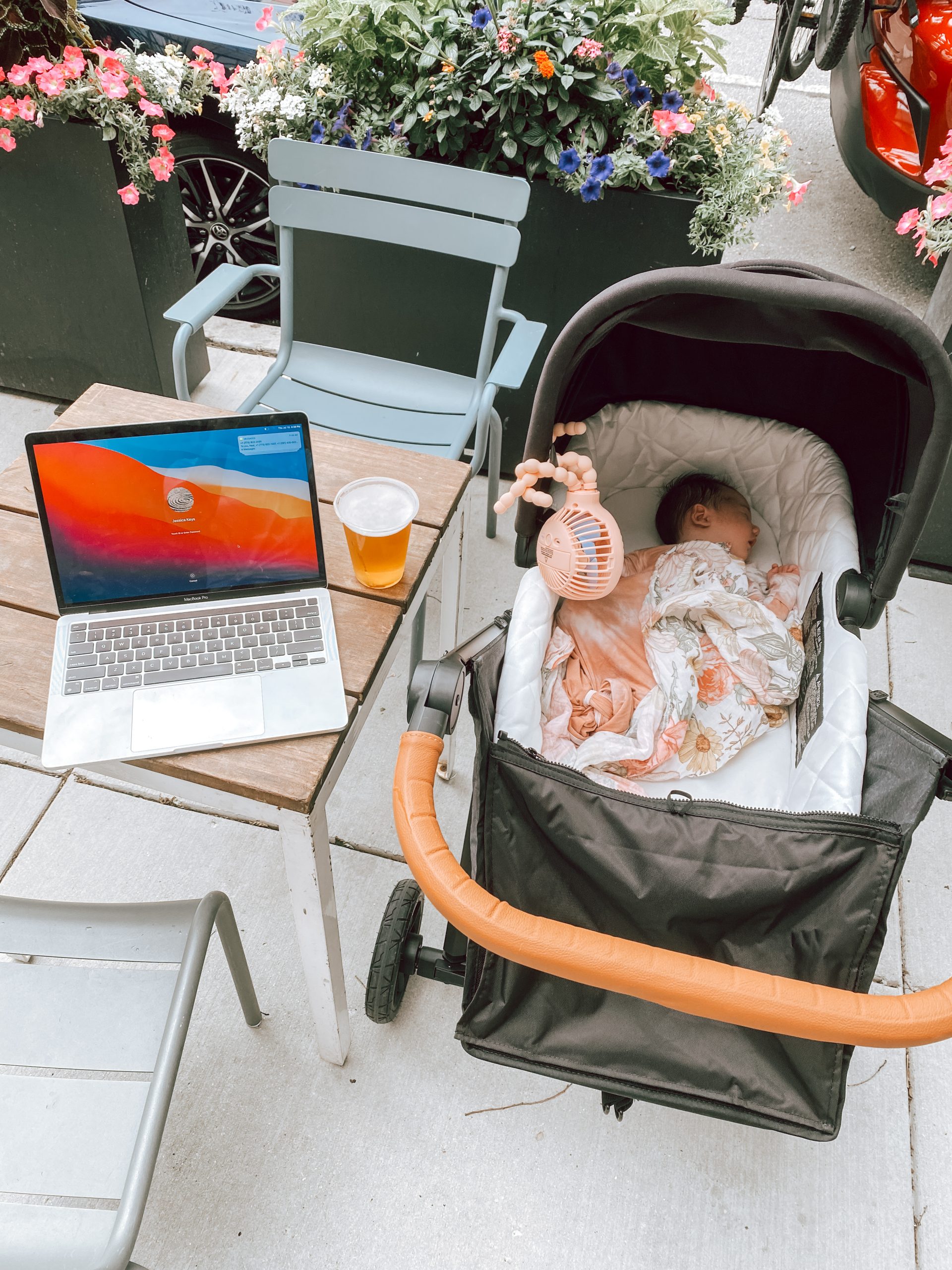
One of my first outings with June alone: I took her down the street for happy hour and I worked on a blog post while she napped! Previous outings in the stroller had resulted in tears from both of us, but this was a win! It made me so much more confident!

Two of my best friends and our girls! A bunch of our friends (I think there were 17 adults, 5 kids and one dog?) rented a house in Michigan last month. Not going to lie, there were several times beforehand where we were second-guessing our decision but it could not have gone smoother. Kids are so much more adaptable than you give them credit for, and it was one of the biggest highlights of the whole summer. I’m so glad we didn’t hold ourselves back for fear of it being a disaster with the babies! We were all so proud of ourselves.
Practice “The Pause”
I feel like this was a very big revelation when this book first came out, not so much anymore probably–but it’s the concept of letting the baby cry for a few minutes before picking her up. Babies make lots of noises and fuss–often before they’re even actually awake! By tending to them IMMEDIATELY we create bad habits and the baby never learns to self-soothe. I won’t get into specifics here because how long/when you let your baby cry really depends on the type of baby sleep philosophy/protocol you follow. (There is no wrong method!)
We follow Moms on Calll (making tweaks here and there as needed where we feel necessary) and this is a big part of their method and it works great for us. (BTW highly recommend buying the book and joining their Moms on Call support Facebook group! So helpful!)
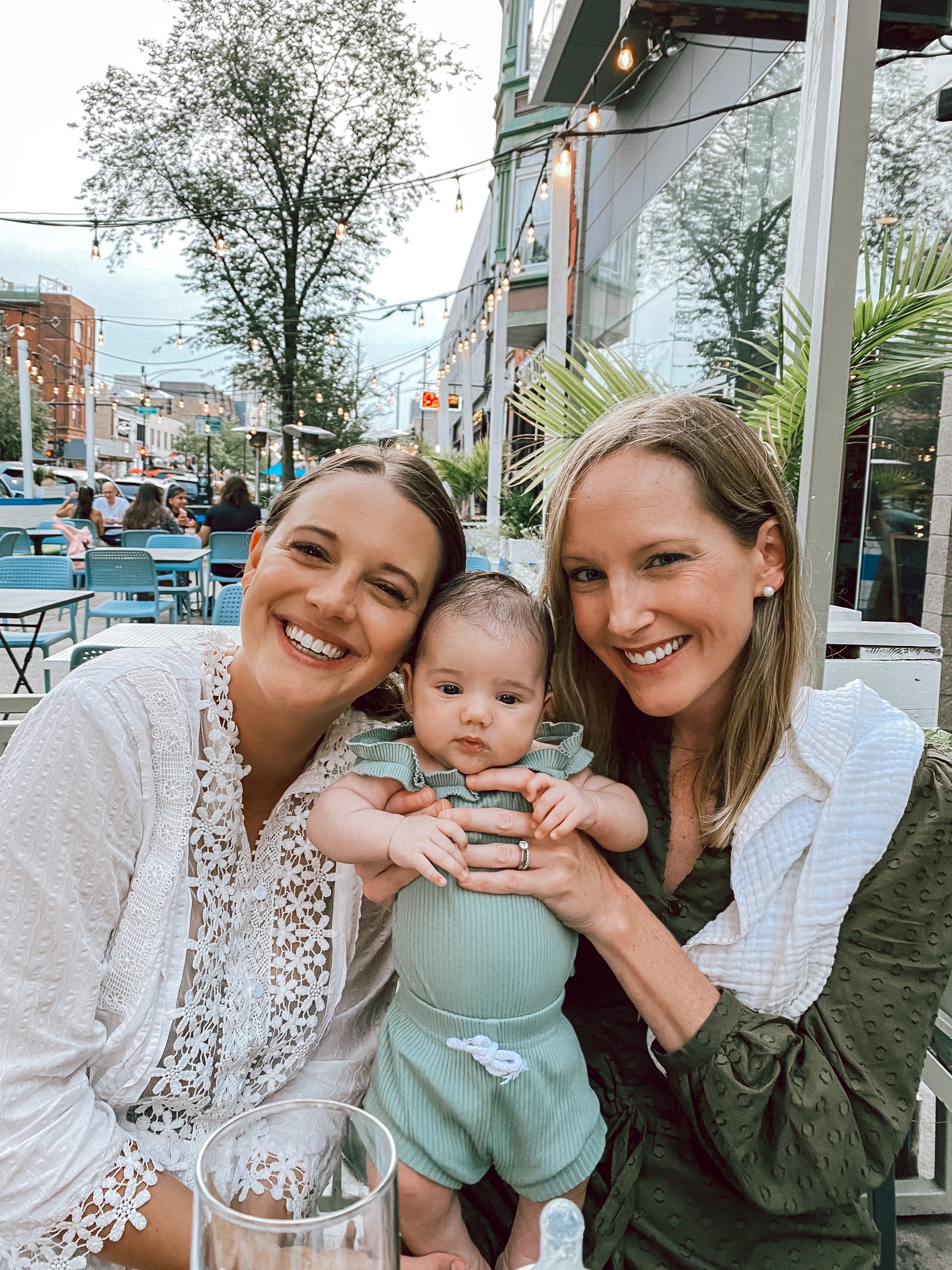
Out to dinner with Kelly and Mitch (and Lucy!) earlier this summer! Being able to spend time with all our girls together has added a whole new amazing layer to our friendship.
Implement a “framework”
As the book describes, the “Cadre (kah-druh)— is the frame or framework. A visual image that describes the French parenting ideal: setting firm limits for children, but giving them tremendous freedom within those limits.” Providing structure because that’s what kids thrive on, but not SO much structure that it feels limiting to anyone.
The book also gives an example of a French couple vs an American couple to showcase how the “cadre” fits into parenting philosophy:
“To the French couple, it seemed like the American kids were in charge. ‘What struck us, and bothered us was that the parents never said ‘no.’ … It suggests that the American kids don’t have firm boundaries, that their parents lack authority, and that anything goes. It’s the antithesis of the French ideal of the cadre, or frame, that French parents talk about. Cadre means that kids have very firm limits—that’s the frame—and that the parents strictly enforce those limits. But within those limits, the kids have a lot of freedom,”
This will absolutely become more important as June gets older, but even now, the concept can still loosely apply and is a philosophy we’re already using, mostly as it pertains to her schedule and the things we can do as parents to set her up for success. For us, the firm boundaries are when she eats, naps, and goes to sleep at night. (Again, we follow Moms on Call schedule/protocol). We also adhere to the schedule when we can and don’t stress about when we can’t. I’d say it’s about 80/20. If we get off-track, it’s not a big deal to get back on again, because the schedule is the framework.
All we can do is offer her the bottle at specific times, offer her nap at specific times, etc, following a schedule that has been created according to her particular development stage. It usually works well, but sometimes it doesn’t. She may not want to nap her full nap. (Happening often these days.) She may not want to eat her full bottle. That’s fine! She has the freedom to do so. We can’t force her. We move on but keep to the schedule.
This framework is important for her because she thrives within the routine.
It helps her learn healthy sleep habits, and also provides us the flexibility we need within the framework. (Also important to note, WHERE these things happen can also be up in the air. She can eat her bottle at a restaurant. She can nap in her carrier or her car seat. This flexibility within the framework helps her to learn to roll with the punches!)
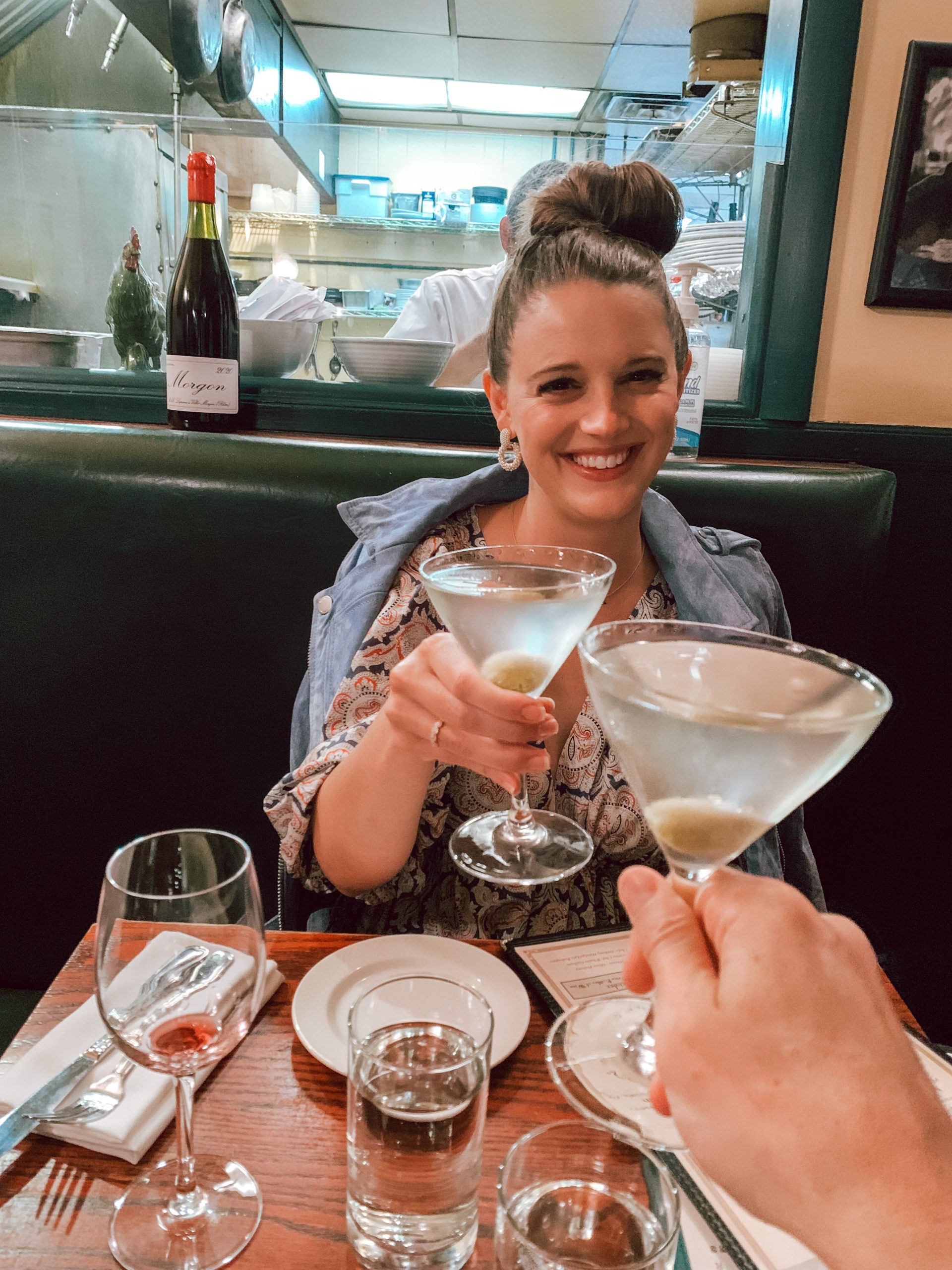
Our first date night post-baby for my birthday when June was 2 weeks old! A martini has never tasted so wonderful!
“Adult time” is a regular norm, and there’s no guilt about it:
“The French have managed to be involved without becoming obsessive. They assume that even good parents aren’t at the constant service of their children, and that there’s no need to feel guilty about this. “For me, the evenings are for the parents.” one Parisian mother tells me. “My daughter can be with us if she wants, but it’s adult time.”
Of course, June is too little to understand when it’s adult time or parent time, and the concept of “evenings are for parents” doesn’t relate as directly now as it will when she gets older, but the concept still applies now!
Additionally, as she grows up, I want her to see that her parents’ lives don’t revolve around her, and that her parents are multifaceted people who have lives and interests outside of being just parents! (This is part of the reason it was so important for me to go on my Paris trip! I want that to be an example for her to look back on when she’s older!) And I think seeing my own mom model this as I grew up was also very impactful for me.
I now watch mothers my age kill themselves having to play with their kids all day. My mom never played with me–she didn’t want to! She didn’t sit and watch TV with me–she didn’t want to. There was lots of “adult time” and “kid time” in my childhood and I think it made me a much more independent, creative kid. She never felt guilty about it, and I don’t either. This French parenting philosophy is the same.
Anyway, the whole “adult time” thing is another area I’m particularly proud of because we never stopped prioritizing it.
Many American moms wait months and months before they go anywhere without their baby (because of course, it’s hard to leave them, but also because MOM GUILT!) I think when this is the case, it becomes REALLY hard to remember what your identity was and who you were “pre-baby.”
I’m sure someone is going to interpret this as me being selfish (and that’s fine) but just the thought of letting months go by without ever getting extended periods of time to myself makes me feel as though the walls were closing in. It has nothing to do with how much I love June–I just NEED time to myself, and also time with my husband–alone! Quality time with just the two of us has always been really important in our relationship. Therefore, we made the conscious decision to continue putting in the effort to prioritize that.
My mom came to stay with us for a week when June was two weeks old, and she would stay with June while Neal and I would get out of the house and go for walks just the two of us. Or we would grab a beer down the street for happy hour. Neal also planned dinner and drinks for my birthday to two new spots we’d been wanting to try!
Additionally, I’m proud that Neal and I are really good at making sure the other one has the time to do WHATEVER they need to do to feel normal.
Neal needs time to work out every day–that’s a non-negotiable and that’s not ever something I’m going to guilt-trip him for. It’s how he de-stresses and it’s what he needs to feel like himself. For me, it’s not so much an “I need to do X every day” but on the regular, I need adequate sleep, I need to get dressed and put makeup on, I need to spend time solo with my girlfriends, and I need time to decompress and read in a quiet room with nobody talking to me. We switch off with June to make time for the other one to get what they need and we don’t resent the other for taking the time to do those things that keep us feeling mentally ourselves.
I have been incredibly fortunate to have not [so far] experienced an identity crisis because I never lost touch with “pre-June Jess”–it doesn’t feel like I am “new Jess” either–I am now just, “Jess who is also a mom now” and I attribute a lot of that to prioritizing “adult time.”
I never lost sight of what it felt like to be me, and therefore, “mom Jess” is not my identity.

Like I mentioned above, this is just a small slice of our experience with parenthood so far as it pertains to our parenting style and what has worked for us. If your experience is different, or you have a different outlook, that is so valid! I’m simply sharing our personal point of view in the hopes that it can benefit someone else out there! I hope this was helpful for anyone who is considering having kids, currently expecting, or just looking to get to a balance that feels right after having kids! (And even if you don’t want kids, I still think Bringing Up Bebe is a really interesting read from a culture and psychology perspective, and would highly recommend it regardless!)

